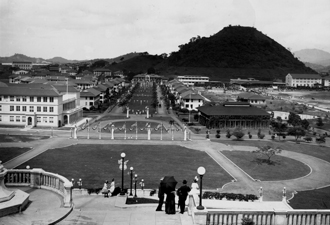Professors traverse the Panama Canal Zone

This 1919 photograph shows Fourth of July decorations on the Prado, the administrative center of the town of Balboa, located at the Pacific entrance to the Panama Canal. It is where the administrative offices of the former Canal Zone were located. (Photo from the Panama Canal Authority)
For the Reeses, the book and exhibition are the result of a trip to Panama with Tulane President Scott Cowen in 2000.
After decades of U.S. control, the Canal Zone had recently reverted to Panama. With the sudden departure of the Americans, there were concerns about overdevelopment and how to preserve the legacy of the 500-square-mile Canal Zone. Although the control of the Canal Zone now lay with Panama, there was still a question whether the area's history was part of Panama's history, and how to incorporate the two.
These concerns inspired the Reeses to research and document the design and construction of the Panama Canal Zone's civilian and military communities and their ongoing legacy.
The Reeses say that in the years since Panama has taken control of the Canal Zone, the country also has taken ownership of the Canal Zone's history.
"People in the Panama design community see the Canal Zone's architecture as part of their heritage," says Carol Reese.
The Reeses' book and its exhibition are an effort to share with Panamanians a deeper understanding of the zone's development and history.
With the centenary of the canal's opening coming up in 2014, the Reeses have been commissioned to publish a second book, which will cover the Canal Zone's growth and history from 1920 through 1970.
The Reeses also plan to teach a class on their research. The class, Housing, Labor and Community Development: Panama Case Studies, will be offered in the spring semester.
Alex Chasick, a freelance writer living in New Orleans, is a 2005 graduate of Tulane University.
